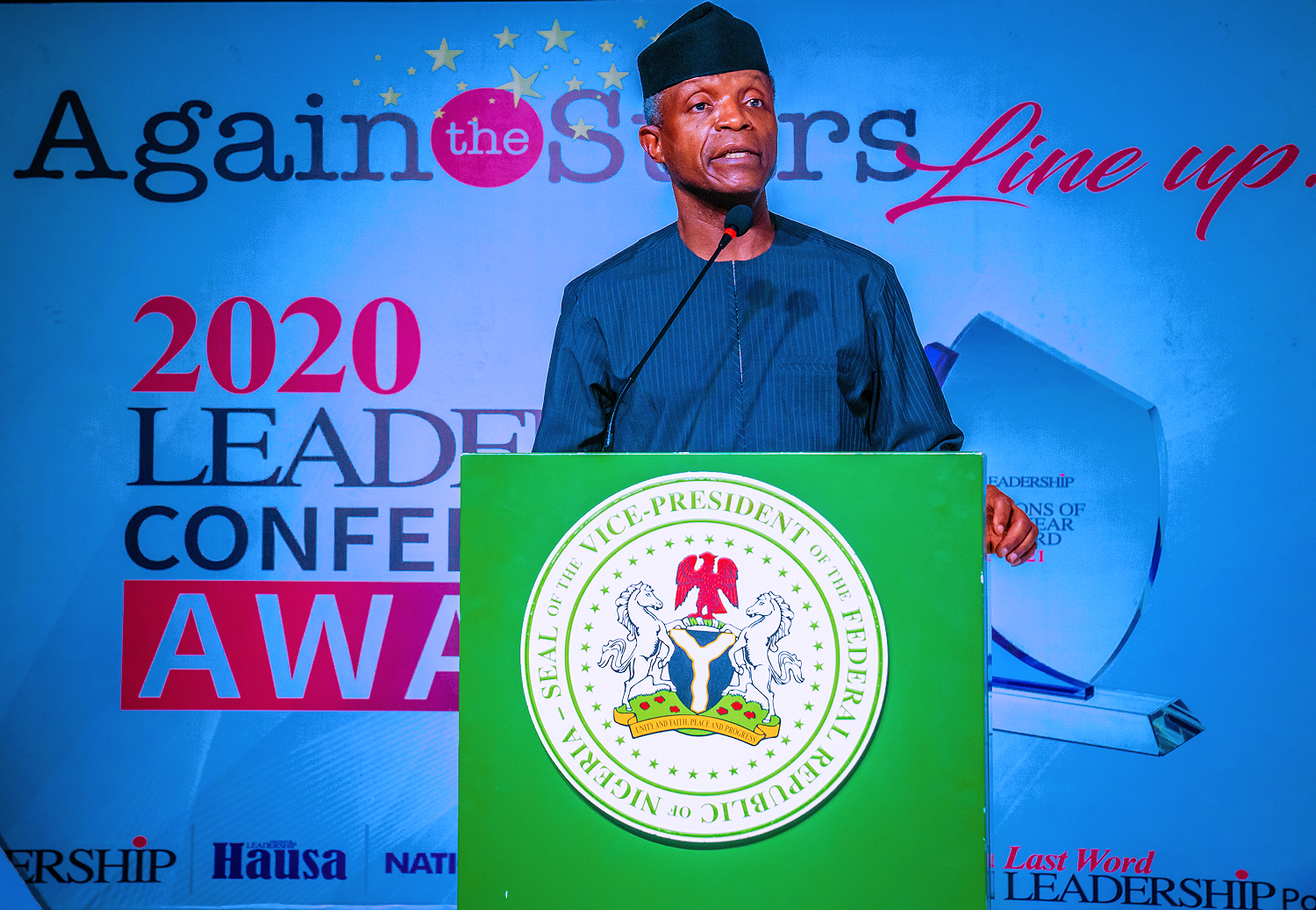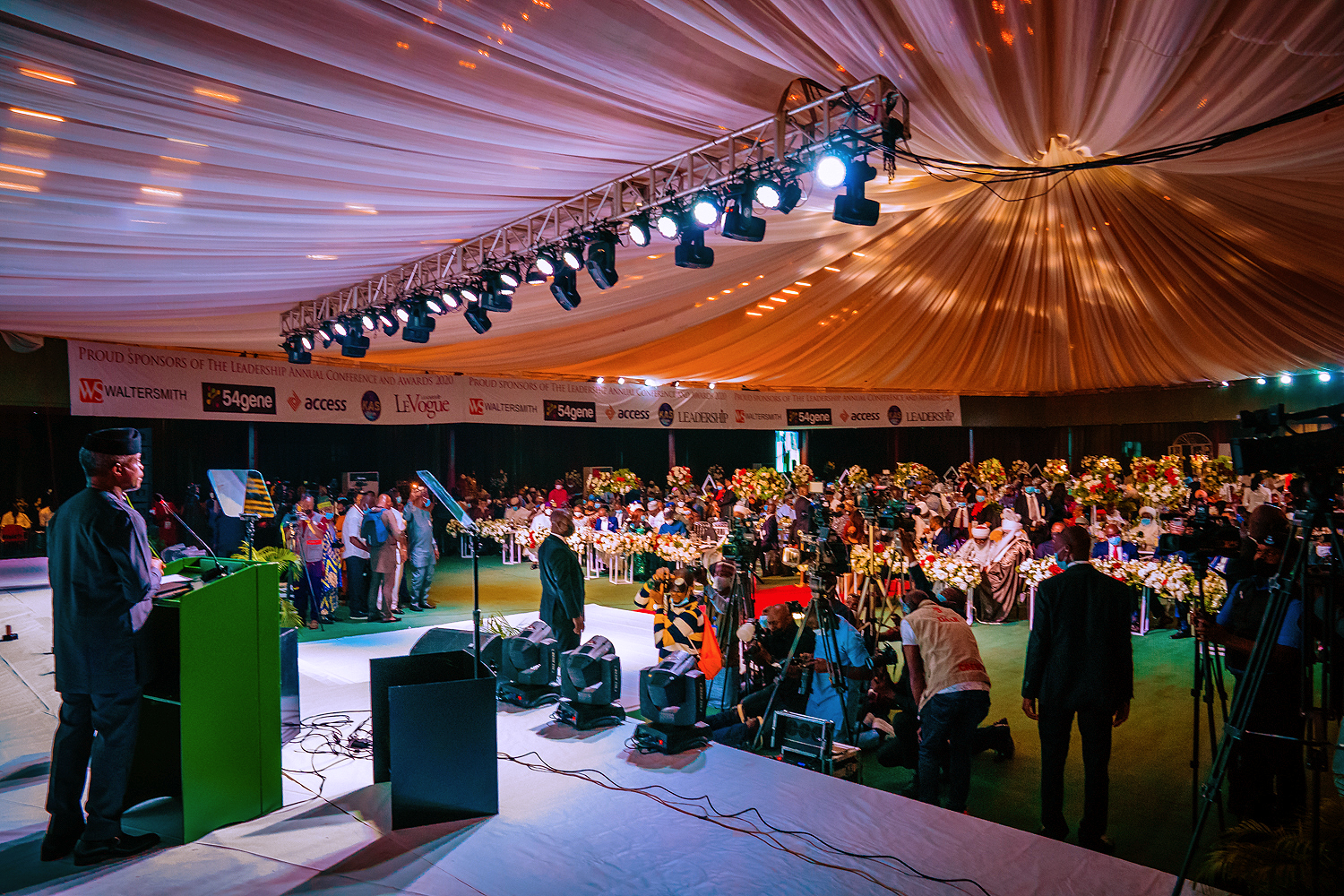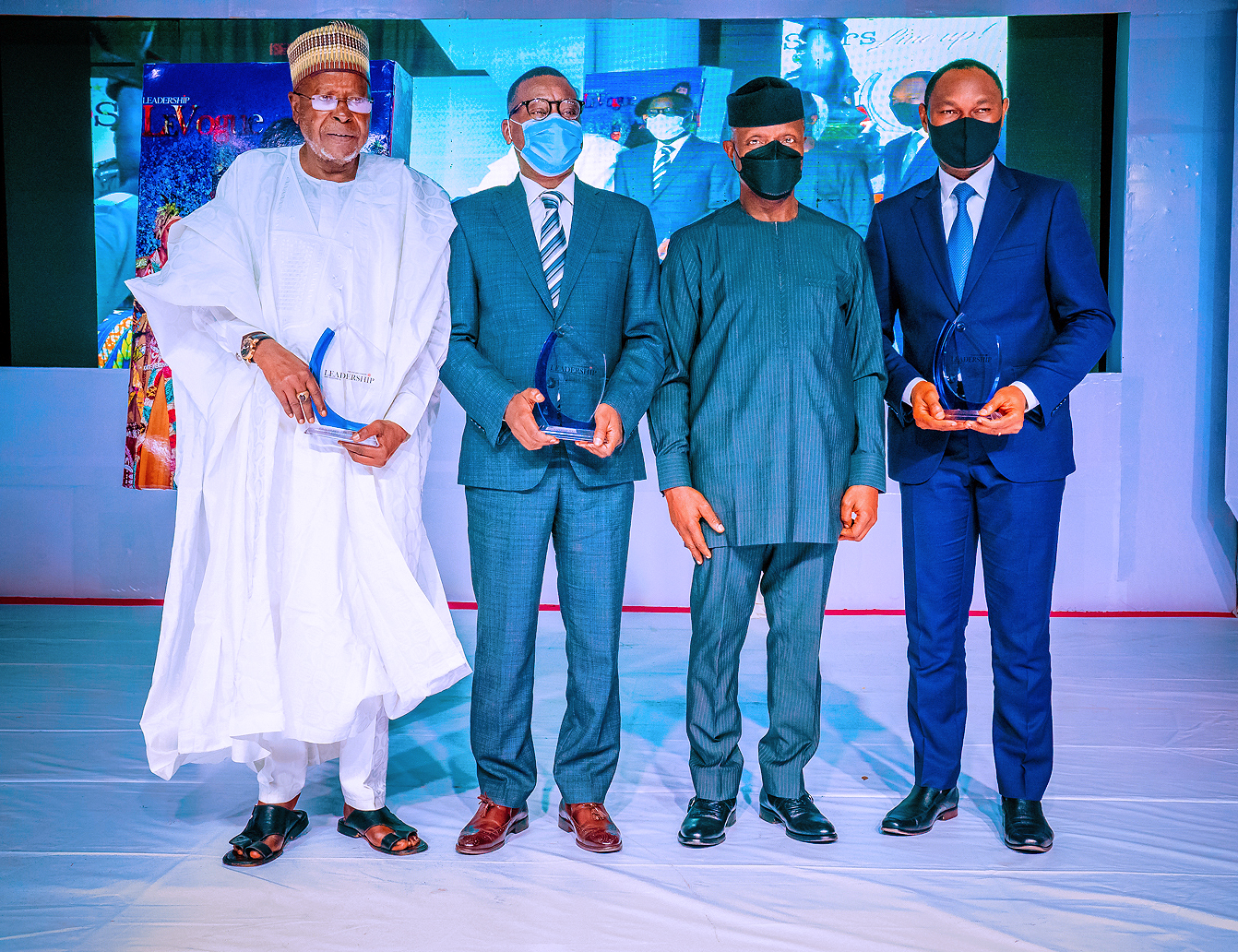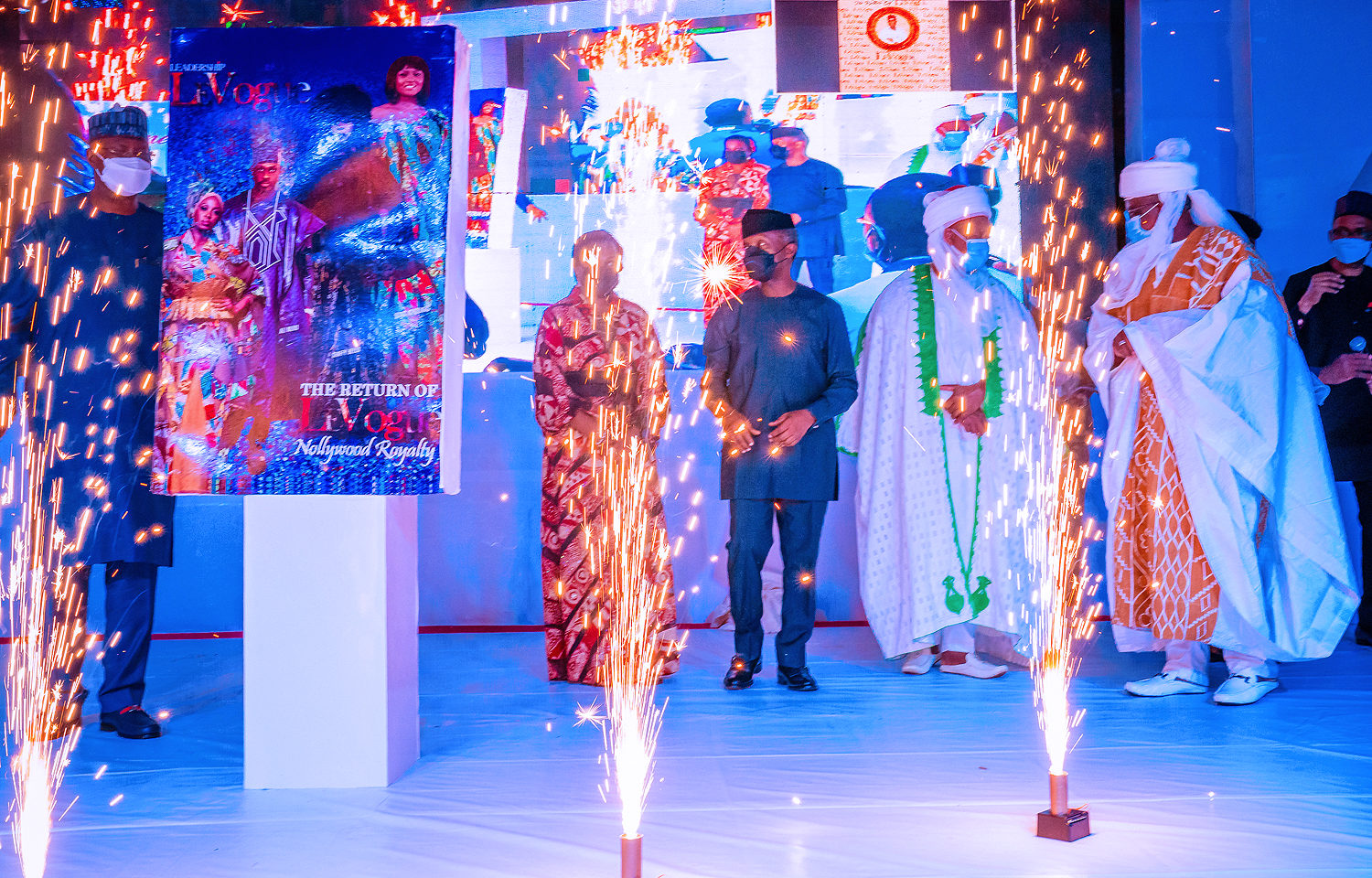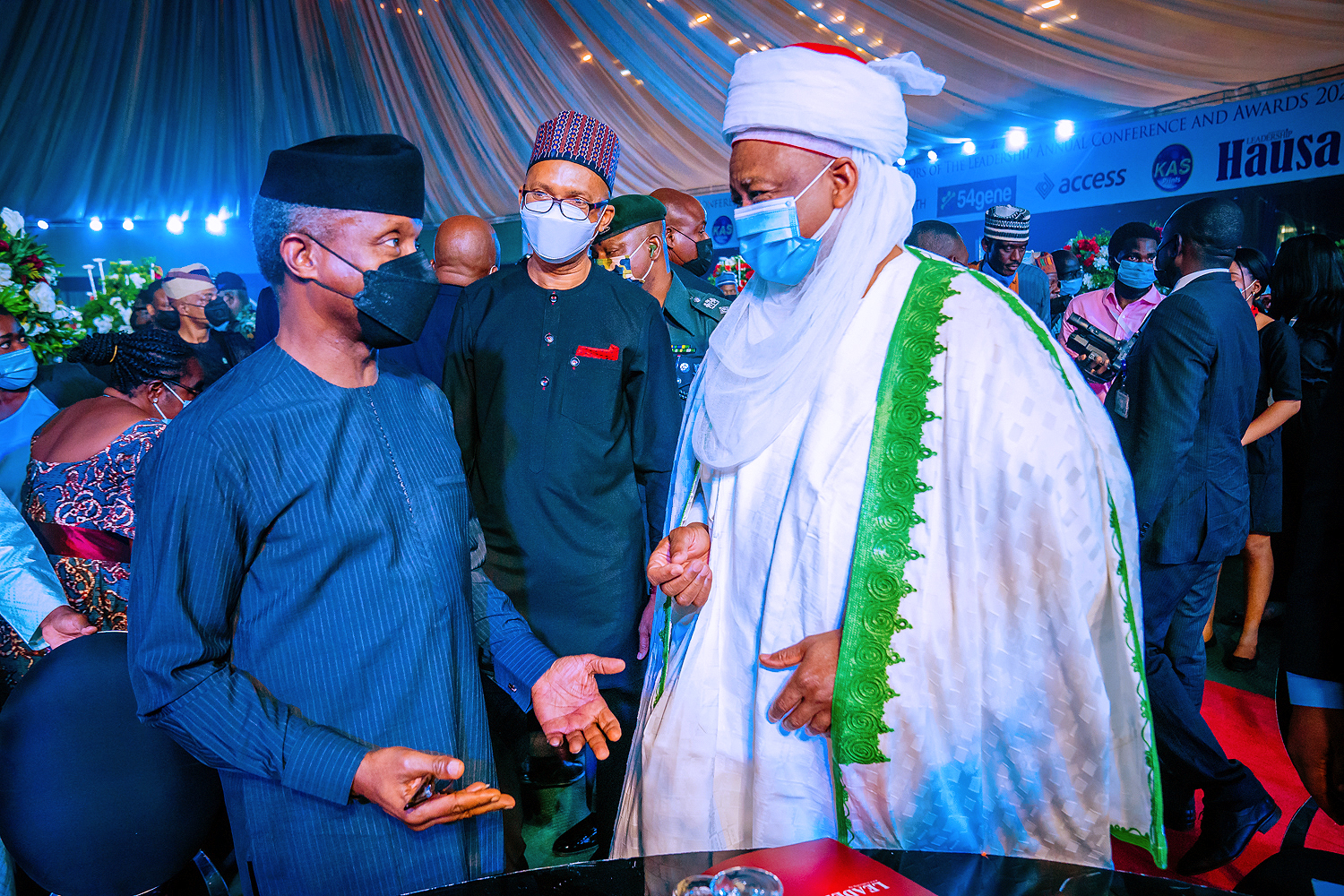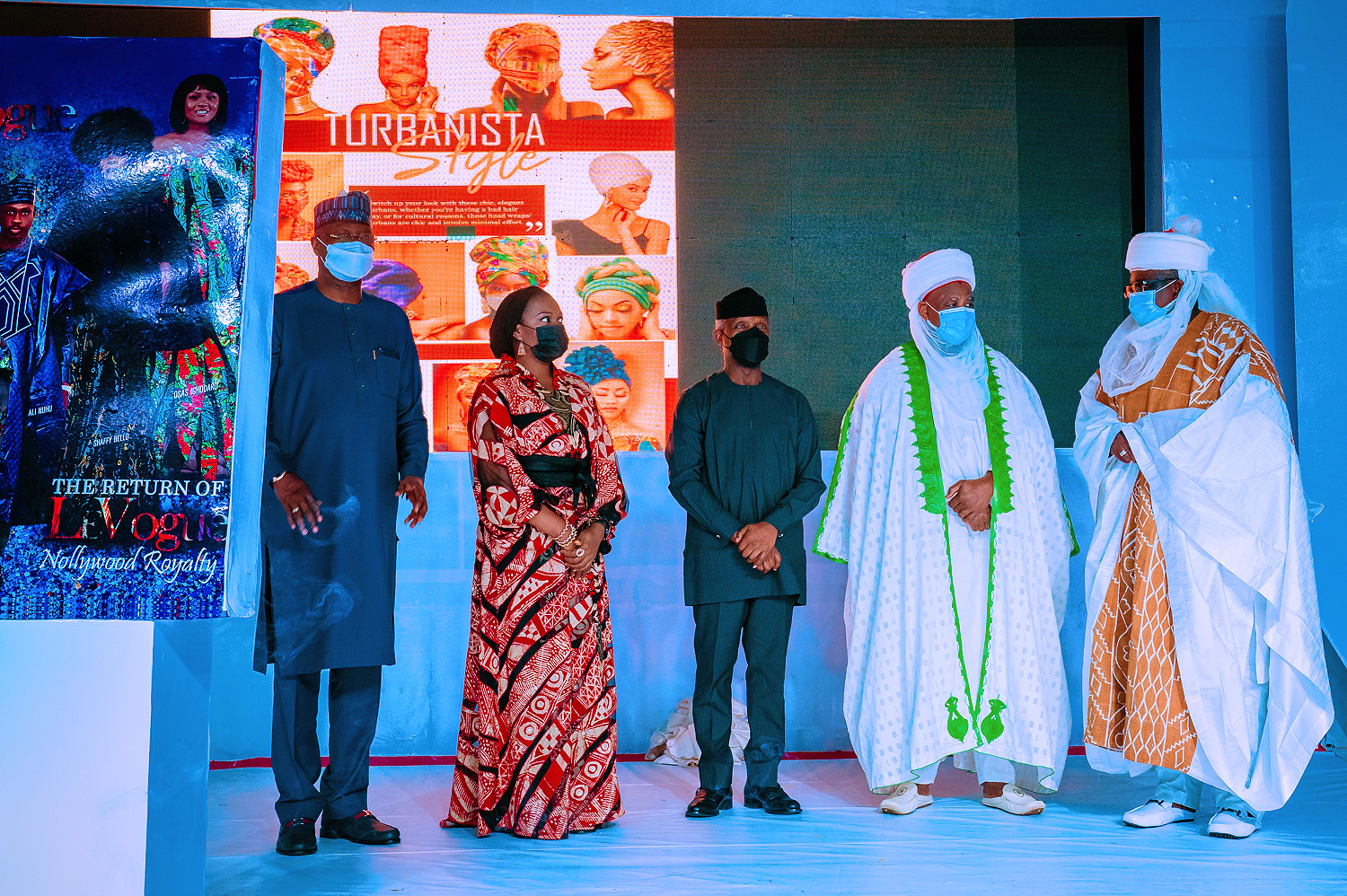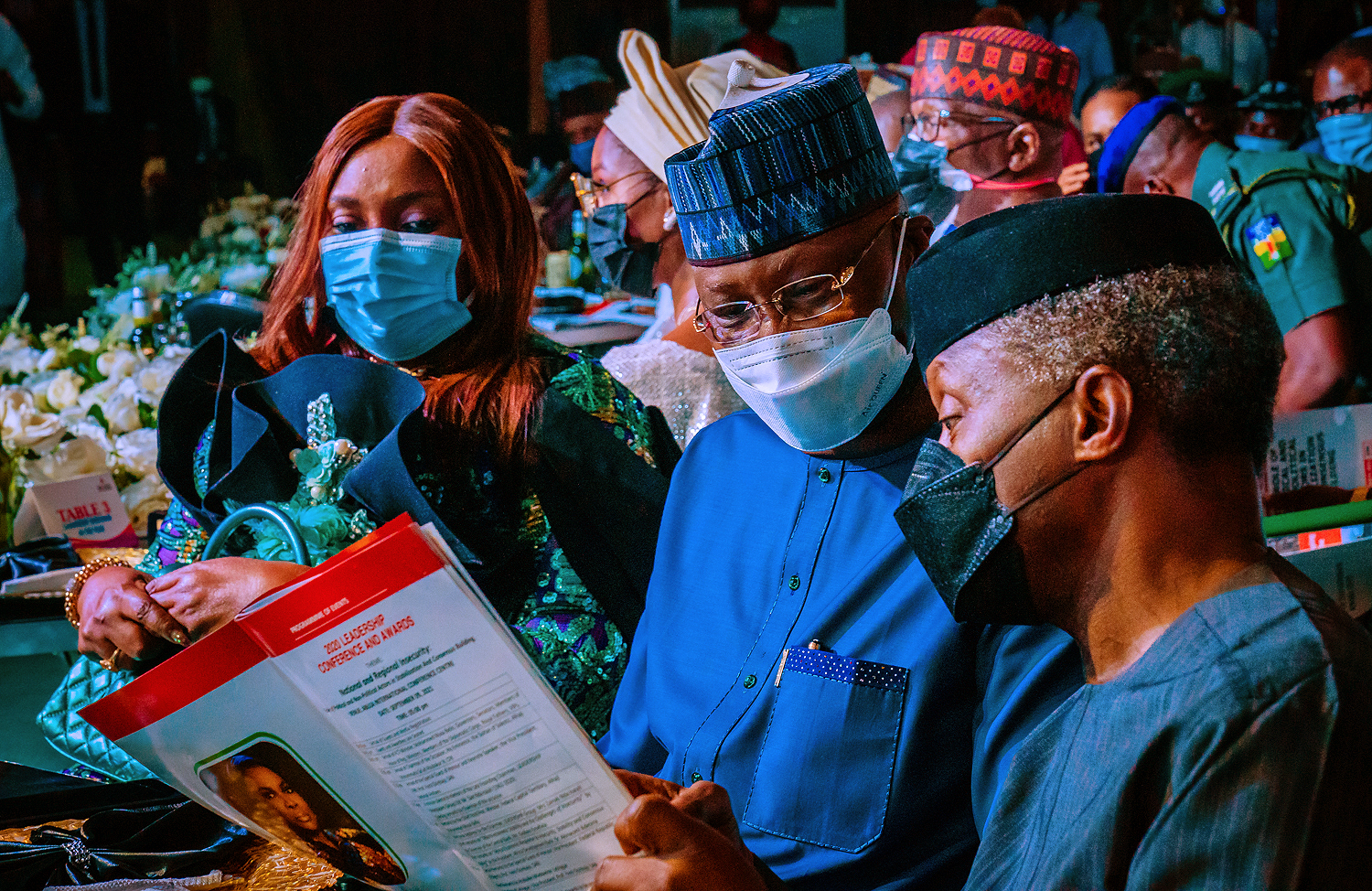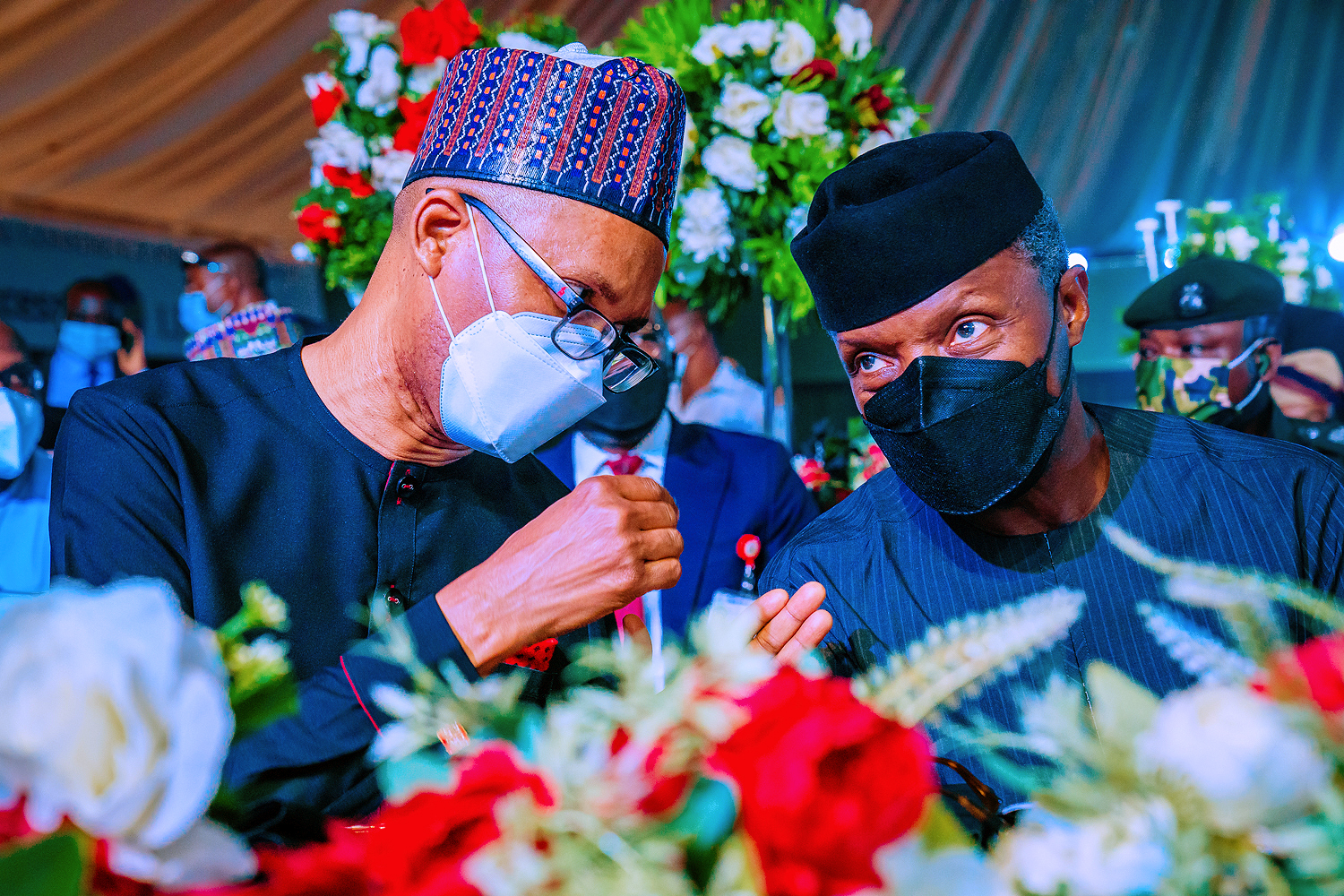Keynote Address At The 2020 Leadership Conference And Awards Night
AS ELITES, LET US THINK, DEVELOP & IMPLEMENT IDEAS THAT CREATE OPPORTUNITIES FOR MAJORITY OF OUR PEOPLE – OSINBAJO
Adds: We should avoid drift towards darker impulses, but instead counter fear & division with inspiring faith, creative optimism, and solidarity.
“The operative principle here is “Noblesse Oblige” which in English means “nobility obligates.” It conveys the idea that nobility extends beyond mere entitlement and requires people of noble status to fulfill social responsibilities. It proposes that the advantage of education, position, or wealth, especially in a poor society, comes with the responsibility to think, develop and implement the big ideas that would create opportunities and livelihood for the majority.” – Osinbajo
KEYNOTE ADDRESS BY HIS EXCELLENCY, PROF. YEMI OSINBAJO, SAN, GCON, THE VICE PRESIDENT OF THE FEDERAL REPUBLIC OF NIGERIA AT THE 2020 LEADERSHIP CONFERENCE AND AWARDS ON THE 9TH OF SEPTEMBER, 2021
PROTOCOLS
Let me begin by saying how delighted I am to be here at this Conference and to commend the Board and Management of the Leadership Newspapers and their collaborators for putting together a forum for dialogue in the tradition established by the esteemed founder, our beloved departed brother, and colleague, Sam Nda-Isaiah. It is a privilege indeed to join you in honouring the memory of that great patriot and innovator Sam Nda Isaiah.
We are meeting against the backdrop of economic adversity, inflamed fault lines, and social resentments. The insurgency in the Northeast, kidnappings and terrorist acts in the Northwest, and threats of secession in the Southeast and Southwest.
In the light of all these challenges, the theme of this Conference: “National and Regional Insecurity: The Role of Political and Non-Political Actors in Stabilisation and Consensus Building”, is clearly an inspired one.
In considering the theme of this event, it is worth noting that often when we explore the concepts of national and regional security, there is a tendency to anchor the discourse around the machinations and intrigues of externally-generated vulnerabilities, external adversaries. So, we argue that the problem of State fragility in Africa is on account of the colonial origins of her nation-states, the notion that Nigeria is a hastily and arbitrarily cobbled together patchwork of mutually alienated kingdoms and as a result, has remained plagued by fundamental challenges rooted in its founding is popular, but not the whole truth.
Indeed, it is my view that the colonial beginnings of African nation-states do not constitute the sort of immutable obstacle to nation-building that it is made out to be. After all, colonialism was a historical global phenomenon that spawned nation-states everywhere across the world from Europe and Africa to Asia, North America, and South America. We have examples of many of such nation-states that are successful. Colonial origins are therefore not necessarily a predictor of national prosperity or state failure.
In any case, there is a lot of scholarship and research that shows that our ethnic nations share a long history of trade, diplomacy, migration, and conflict – all of which ensured that by the time the colonialists arrived, we were not strangers to each other. And if we were not strangers to each other then, we are most certainly not strangers to each other now.
The truth therefore it seems to me is that the external reasons we cite as reasons for our problems cannot thrive without severe internal weaknesses in our society. The chief weakness is a human one – our elite, our political, economic, and religious elite.
An elite that has so far proved to be socially irresponsible, i.e., one which either by selfishness, negligence or ignorance or a lack of self-awareness has so far been unable to build the institutions and more importantly, the social and political consensus upon which a just and orderly society can stand. And because dominance must be premised on some consensus, the elite depends on a dubious one, promotion of tribal and religious fault lines for legitimacy.
So, where are we today? On a nationwide and region-wide scale, we are seeing challenges to national order driven by a profound and pervasive sense of exclusion and marginalization. And I do not speak of ethnic or religious marginalization which is really another elite dog whisper to acquire more for themselves in the contest for booty. I speak of a division between the have- nots who have no hope and the haves who seem to have it all. So, the attacks we see on law and order are themselves symptomatic and they are driven by emergent critiques of the fabric of order itself.
These critiques are manifesting as insurrections and insurgencies along various axes of identity. These rejections of formal institutions may be driven by conceptions of religious obligations, ethnic identity and generational antipathies but that is only superficial. What they have in common is that they are patterns of solidarity of those who have no stake in an orderly society because such society offers them nothing, and are fundamentally violent and implacable opposition to a system that appears to favour only a few.
The recognition that the system is not working optimally for many of our people should inspire a broad-based movement for reform that works to recalibrate the present order and attune it more to the aspirations of our people. To be sure, the cost of reforming the system is considerable, but it is certainly far lower than the cost of letting the system be destroyed in the hope that it can somehow be rebuilt from scratch. This is a risk that we cannot afford to take as a nation.
So how do we mediate these conflicts?
First is consensus building; consensus building is essentially about finding an acceptable ‘middle ground’ among contesting options to the resolution of issues. When properly agreed upon, it leads to harmony, equilibrium, and stability, and generates mechanisms for pacification in political crises and conflicts.
In Nigeria, a consensus has been built so far in terms of the choice of a Federal System of Government, which has been buttressed by the creation of States; the identification of the boundaries of powers across Federal, State, and Local governance; the notion of affirmative action against marginalization, such as the federal character principle, etc.
As with all countries, newer realities keep fostering situations that could lead to misunderstanding and conflict. These contingencies challenge citizens and governments to build consensus around which resolutions of these conflicts can be promoted. The question that arises for us is whether as the elite, we are public-spirited and historically responsible enough to engage in the arduous process of consensus building and be conscientious custodians of our national institutions.
The second is Mediating Elite Competition and Conflict. In considering the role of political and non-political actors in stabilization and consensus building, we must address a threat to peace and safety emanating from society itself. We
are confronted by a pervasive culture of violence that manifests as two strains. The first is the nature of elite competition for more advantage and privilege that is generally prosecuted without considering the long-term health of society. In this context, we see a quest for power that is conducted in ways that are ruinous and destabilizing.
The second strain is exemplified by resistance to authority driven by non-State actors who are nihilistic and anarchic in both their character and aspirations. These dark forces manifest in the violent imposition of the will of the strong upon the powerless. Violence and impunity have many faces, they are not only garbed in the uniforms of irresponsible agents of the State that abuse their authority, they are also increasingly clad in the garments of ordinariness and in the clothing of a new breed of nihilist combatants that have declared war on society itself.
These two strains are mutually reinforcing. A scorched earth no-holds-barred contest for power that includes the corruption and subversion of State institutions results in the lack of State capacity to deliver public goods. As a result of these deficits, the segments of society that consider themselves left out or left behind with nothing to lose marshal their resentment and organize violent assaults on public order.
So what do we do? There is no doubt that our country is going through times of trial and testing. Many of our people are dealing with adversity on several fronts. It is understandable for discontent to emerge and inspire agitation. In a democracy, agitation – the act of making our voices heard in respect of our concerns – is entirely legitimate. What is profoundly problematic is when we employ destructive and illicit means in pursuing agitation.
It is also understandable that we may find that some of these agitations resonate with us. We may consider them legitimate causes and identify with them as such. However, the temptation is that our sympathy with legitimate causes blinds us to the destructive and illegitimate means employed by those that pursue these causes. This is a temptation that we must resist.
I would be the first to admit that our system is not perfect, but it does prescribe the ways in which discontent can be channeled through constitutionally guaranteed rights to vote, to associate, to protest, and to express ourselves. Change is possible through the system, but only if we engage it rather than destroy it. Thus, while the current system is not perfect, it can only be improved as more of our people engage it.
In a country as diverse as ours, the diversity of opinions and persuasions is not only to be expected, it is to be welcomed. The aim of our national conversations should be to promote a consensus for progress rather than to promote discord and disharmony. Our national union was forged through dialogue and negotiation as our founding fathers traded compromises in the process of making our country. Over the years, our union has been renewed through dialogue. We must be committed to continuing this tradition of renewing our nation through the tried and trusted means of conciliation, compromise, and consensus.
Discernment today requires us all to recognize the various faces and guises of violence and extremism. It is to recognize the agents of anomie and hatred and to call them by their proper names even when they appear to speak the same language as we do or seem to worship as we do.
To be clear, in calling for compromise and consensus, I certainly do not mean that our people should be lulled into a forced silence or a passive acceptance of whatever they find unacceptable. I mean that their discontent and energy can be channeled towards constructive and positive action. For instance, communities can be mobilized to participate more fully in civil life and drive movements that seek greater accountability across all levels of government.
While there is indeed a serious contention for the future and a battle for the soul of this nation raging, the weapons of our warfare are necessarily different. The tools with which we will build a new country and the weapons with which we will fight for her posterity are of a different order.
As Reverend Martin Luther King Jr famously said, “Destructive means cannot bring about constructive ends.”
We contend for the soul of our country by promoting civilized values. In particular, we must uphold a culture of life – the affirmation of the value of human life. We cannot accept unlawful violence in any guise even by those who claim to be using it in response to violence. We need an intergenerational, ecumenical, and pan-Nigerian coalition willing to uphold the value and sanctity of life above and beyond all causes and differences.
Our history teaches us that whenever people have succumbed to the temptation to use fear, hatred, and violence to achieve their ends, they have unleashed destructive forces upon their communities with great human and material costs. A truly just cause can only be pursued by using just means. A truly noble cause cannot be attained by ignoble methods. Whatever is gained by violating and oppressing others cannot last.
Let me be clear, the principal role of the State as far as guaranteeing peace and order, is unimpeachable. Our Constitution enshrines the moral imperative of the State by asserting that “the security and welfare of the Nigerian people shall be the primary purpose of government.” This is the inescapable duty of all of us that are elected to lead and it is one for which we will be held to account. However, the practical fulfillment of this mandate requires that partnerships be forged between the State and civil society as well as between political and non-political actors.
What kind of elites should we be?
The task before us is that of renewing the social contract, creating more inclusive institutions, growing the economy, and generating opportunities for our population.
Two realizations are especially poignant at this point. The first is that this task cannot be accomplished in a climate of sociopolitical instability. Secondly, no project of social renewal and transformation can succeed without the involvement and indeed the leadership of elites.
The operative principle here is “Noblesse Oblige” which in English means “nobility obligates.” It conveys the idea that nobility extends beyond mere entitlement and requires people of noble status to fulfill social responsibilities. It proposes that the advantage of education, position, or wealth especially in a poor society comes with the responsibility to think, develop and implement the big ideas that would create opportunities and livelihood for the majority.
The highest office and duty of the elite is sacrifice, sacrifice, and more sacrifice. It means that we must be prepared to tell our constituencies the truth even if it hurts our political fortunes or our popularity. We must be able to say to the young men and women who say secession is the only way or that we should break up into little nations that that is the way of extinction, not development.
We must, as religious leaders, be able to tell our adherents that people of other religions are not their enemies, they are brothers and sisters, and that they must not allow those who will benefit by division and strife to tell them differently.
We the elites have received much from Nigeria, we are disproportionately beneficiaries of opportunities, gifts, resources, advantages, relationships, and other assets that are only possible because we are Nigerian. It is only right that we adopt a sensibility that guides us in giving back to this country that has empowered us so much and to invest in it in ways that offer returns broader than just our own profit.
Those of us in this conference are by virtue of our pedigree and status, members of a privileged minority. The contrast between our exceptional circumstances and the material conditions of the majority of our compatriots imposes a moral obligation on us to work for the common good, towards a society that works for all by spreading the circle of opportunity.
In times of crisis, the elite must broaden its horizons beyond their specific disciplines and sectors. Accordingly, business leaders understand that it is not enough to focus on making profits, businesses need a healthy society within which to operate and make profits. This is why there are now such concepts as corporate social responsibility and good corporate citizenship. It is not at all paradoxical that some of the biggest charities in the world were founded by the greatest capitalists.
Legal practitioners understand that the imperative of transformative leadership in the legal sector today calls for the Bar and the Bench to insist on the integrity of our system of justice, to insist on speed in the dispensation of cases, and to call out anyone who compromises the system.
The Media elite must recognize that they have a responsibility to exercise discernment in the deployment of their platforms and must reflect upon whether they are amplifying the most insensate, intemperate, and incendiary voices in our midst while marginalizing voices of reason.
The Political elite must accept, through policies and actions, that the purpose of power must be to better the lives of those we serve and give our young ones great hope for the future.
Once we put on the lens of social responsibility, different and higher imperatives come into play. This is what transformational elitism looks like.
Conclusion
In times of crises, we learn and relearn lessons in solidarity and in the value of pulling together. The old rigid dichotomies between the State, the market, and civil society no longer apply. We recognise that the path to the future will be paved by consolidating the interdependence of these sectors. This is why we need a new ethic of collaboration that brings together elements from the public sector, communities, corporations, voluntary associations, and faith groups to jointly work on solutions that we can scale up from the local to the national space. The elite is integral to this process.
Finally, in times of adversity, societies buffeted by uncertainty and anxiety are tempted to drift towards voices that appeal to our darker impulses, to those that traffic in fear, despair, and division. Elites such as those gathered here today must counter such voices by inspiring faith, creative optimism, and solidarity.
I remain unyielding in my belief that we will prevail over adversity by the strength of our togetherness. The present moment is crying out for leaders that can bring our people together, heal rifts between communities and build bridges across divides. This too is perhaps the most urgent imperative of transformational elitism today.
Thank you for listening.
“The operative principle here is “Noblesse Oblige” which in English means “nobility obligates.” It conveys the idea that nobility extends beyond mere entitlement and requires people of noble status to fulfill social responsibilities. It proposes that the advantage of education, position, or wealth, especially in a poor society, comes with the responsibility to think, develop and implement the big ideas that would create opportunities and livelihood for the majority.”


